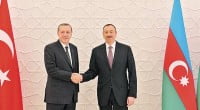Panel Discussion – The Gulen Schools In Central Asia

Date posted: August 13, 2016
Bruce Pannier
The events in mid-July in Turkey, events Turkish President Recep Tayyip Erdogan called an attempted coup, have had implications on Turkey’s relations with many countries. Erdogan blames Fethullah Gulen, a cleric living in self-exile in the United States, for being the mastermind behind the alleged plot to overthrow his government.
After the Turkish government reestablished itself in power and started rounding up suspected participants and leaders, Ankara called on countries where Gulen-sponsored schools had opened to close down those schools. Among the countries the Turkish government called on to shut down these “Gulen schools” were Kazakhstan and Kyrgyzstan, Ankara’s partners in the Cooperation Council of Turkic-Speaking States.
But the governments of Kazakhstan and Kyrgyzstan did not comply.
To look at the reasons these two countries declined to acquiesce to Ankara’s call, and review the difference of opinion among the Central Asian states as regards the Gulen schools, RFE/RL’s communications office arranged a Majlis, a panel discussion.
Moderating the talk was RFE/RL Media Relations Manager Muhammad Tahir. From Bishkek, Emil Joroev, professor at the American University of Central Asia, joined the discussion. Alan DeYoung from the University of Kentucky in Lexington, who taught in Kazakhstan and Kyrgyzstan and has authored many works on education issues in Kyrgyzstan, also participated. And I naturally threw in a few comments from the studio in Prague.
Kazakhstan’s President Nursultan Nazarbaev rather quickly defused the problem with Turkey by making a visit to Ankara to meet with President Erdogan. Nazarbaev did not agree to close down the Gulen schools in Kazakhstan, but he did promise to carefully scrutinize those running the schools and those teaching in them. Joroev said Nazarbaev explained to Erdogan that Kazakhstan does “take the warnings of the Turkish government seriously and that if there is any confirmed reason for taking some serious actions against these schools that Kazakhstan stands ready to do that.”
Ankara urged Kyrgyzstan to close the Gulen schools also, warning they were dangerous, but Bishkek flatly rejected doing so.
Joroev said that shouldn’t have been a surprise. “These 20 or so schools related to Gulen are really some of the most high-performing, highly regarded schools in the country, which are currently educating many thousands of children,” he said.
DeYoung pointed out the schools have filled an important need for many in Kyrgyzstan. “The Gulen schools came and actually created schools in places where there used to be schools that weren’t doing so well anymore…they provided opportunities and they provided resources, they provided classrooms with electricity.”
Both Joroev and DeYoung agreed the Gulen schools appear to be providing students with a quality education. Joroev also pointed out that after the collapse of the Soviet Union, when the majority Muslim Central Asian states became independent, there were many questions about what form of Islam was best suited to their countries.
“I think Kazakhstan and especially Kyrgyzstan did not have a settled policy of exactly what sort of Islam we are going to teach, and in that regard I think the Gulen version of Islam, which is open to science, [a] modernizing version of Islam, sounded like an acceptable option,” Joroev said.
The Majlis participants noted that is not the view in Uzbekistan, Tajikistan, or Turkmenistan.
Gulen’s ideas of Islam are inspired by the life and work of Sufi scholar Said Nursi (Nurchi). Tashkent was the first to believe there was a danger in the works of Nursi. In August 1997, Uzbek President Islam Karimov recalled all students studying at Nursi schools in Turkey. Nursi teachings are banned in Uzbekistan and people have been sentenced to prison for being members of the group.
Tajikistan closed the last of its Gulen schools in 2015, though that could be explained as part of a wider campaign against Islamic groups in Tajikistan that are not totally subservient to the government.
Turkmenistan, where the group is also referred to as “Nurchilar,” closed the sole Gulen-linked school operating in the country at the start of August.
“It’s likely the moral teachings of the movement which alarmed officials in each of those republics,” DeYoung said.
Joroev said that in Kyrgyzstan, when the Gulen schools started to appear in the 1990s “there were lots of rumors about how these schools tend to indoctrinate and brainwash the kids.” He said in Kyrgyzstan’s case, the performance of students in those schools and lack of evidence of ulterior motives had persuaded many in the country that the Gulen schools pose no threat.
Of course, there are still doubts. “That’s possibly the most important question these days, exactly what is the ultimate objective of the movement that we associate with Gulen,” Joroev said.
DeYoung said the Gulen schools were a topic of conversation when he had been in Central Asia previously. “I’ve talked to people about how school leaders or university rectors are trained and the answer has always been ‘well, they’re not trained, they’re just volunteers who come along.'”
For some, lack of clarity on points such as the training of teachers fuels distrust of Gulen schools.
The panelists agreed the Gulen schools that still function in Kazakhstan and Kyrgyzstan would be well advised to show complete transparency about their organization and curriculum to help allay concerns. But it’s unclear how far the schools would be willing to go or how much the authorities in those two countries would need to know to be assured there is no ill-intent.
The Majlis discussed these issues in greater detail and looked at other aspects of Gulen schools and Central Asians’ attitudes toward the organization.
You can listen to the Majlis in its entirety here:
Majlis Podcast: The Gulen Schools In Central Asia
Related article, academic paper:
Source: Radio Free Europe Radio Liberty , August 13, 2014
Tags: Asia | Education | Hizmet-inspired schools | Kazakhstan | Kyrgyzstan | Military coups in Turkey | Tajikistan |
























